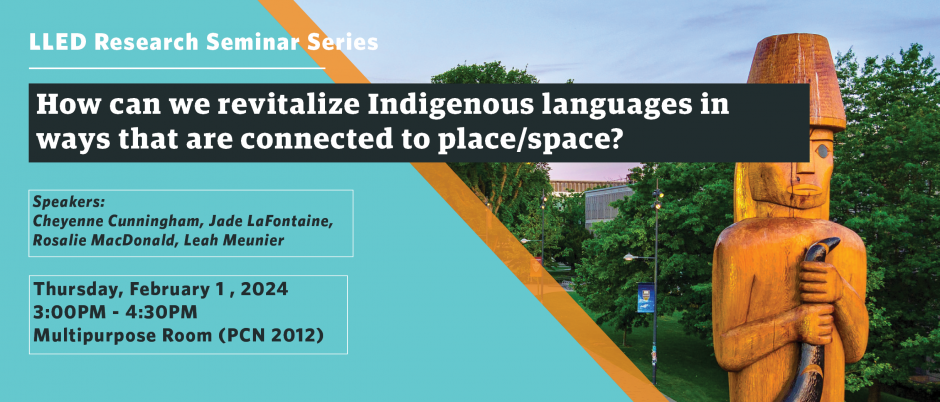
Recap:
Speakers: Cheyenne Cunningham, Jade LaFontaine, Rosalie MacDonald, Leah Meunier
Date: Thursday, February 1, 2024
Time: 3:00PM to 4:30PM
Location: Ponderosa Commons North, Multipurpose Room (PCN 2012)
RSVP: https://ubc.ca1.qualtrics.com/jfe/form/SV_eEzKWQ0Ux03v87c
About the speakers:
Cheyenne Cunningham
ʔa∙ nə siʔəm ̓ nə siyey ̓ ə Cheyenne θə nə skʷix, təli cən ʔəƛ ̓ q ̓ íc ̓ əy ̓ Hello, my relatives and friends, my name is Cheyenne, I am from Katzie First Nation. I am Coast Salish on my dad’s side and English European on my mother’s side. My proposed research explores Katzie First Nation and territorial place names that have been identified in Suttles (1955) Katzie Ethnographic Notes. I seek to document and analyze Indigenous linguistic and relational knowledge embedded with geographic/physical landscapes and revealed through community engagement with the land and place (i.e., stories, cultural practices, such as harvesting knowledge and stewardship activities).
Jade LaFontaine
he n skʷest Jade LaFontaine tuł Spuzzum ʔe ƛ̓ʔak wn, he nskixzeʔ Catherine LaFontaine, he nsqaczeʔ Chief James Hobart. My name is Jade LaFontaine, I am Salish on my father’s side from Spuzzum First Nation, and Algonquin on my mother’s side as well as of mixed European ancestry. I am currently enrolled in my first year of PhD studies and my research focus is ever changing and developing. At the heart of all that I do however is my passion for language reclamation and the desire to help my community and nation speak our ancestral language fluently again. Currently I have been doing a lot of thinking around language and our relationship to place and the context from which our languages come. Even further- how the language determines our worldview, culture, stories, and relationships.
Rosalie MacDonald
Sharing through an Indigenous lens of the Wit’suwit’en ways of knowing by the methodology of storytelling. Incorporating literature into Indigenous storytelling, and revitalizing the Wit’suwit’en language through stories is an essential way to restore language learning. The importance of containing Wit’suwit’en stories from our Carrier ancestors is vital in filling the gap of knowledge from our elders to future generations. Many teachings and knowledge are passed down through storytelling when it comes to revitalizing the Wit’suwit’en language and ways of knowing and doing. Storytelling is a practical way of bringing back historical stories, knowledge, and cultural values. Storytelling incorporates a diversity of teaching topics and strategies such as oral, written, visual, and digital storytelling. Storytelling is a traditional method used to teach cultural beliefs, values, customs, rituals, history, practices, relationships, and ways of life. Storytelling is universal and can be utilized in every culture. A story of the Wit’suwit’en ways of knowing will be shared through a TPRS (Total physical response story) method that has been known to be an effective way of teaching language. TPRS includes fun strategies in how others can teach language through the method of storytelling and teaching by using TPRS. The language of the presentation will be in English, and Wit’suwit’en (Carrier).
Leah Meunier
ʔəy ̓ swéyəl, Leah Meunier θə nə skʷix tən ̓ i cən ƛ ̓ q ̓ íc ̓ əy ̓ təməxʷ. My name is Leah Meunier, I reside in my q ̓ íc ̓ əy ̓ (Katzie First Nation) community with my husband and five children. I am currently enrolled, in a PhD program, at the University of British Columbia in Language and Literacy Education. Learning my hən ̓ q ̓ əmin ̓ əm ̓ language in the absence of fluent speakers, with limited accessible language resources is what motivated me to continue my studies. My work will consist of three phases: firstly, to identify and document Katzie traditional, ecological, and cultural, knowledge (KTECK). Secondly, story creation that reflects KTECK and our seasonal round. Lastly, exploration of how KTECK has been intergenerationally learned and shared historically, and presently. My own story creation has been fueled by the need to create accessible resources; so, my people don’t have to work so hard in their reclamation of their language and culture.